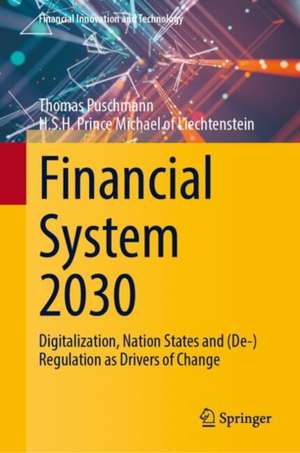Financial System 2030: Digitalization, Nation States and (De-)Regulation as Drivers of Change: Financial Innovation and Technology
Autor Thomas Puschmann, H.S.H. Prince Michael of Liechtensteinen Limba Engleză Hardback – 28 mai 2024
This book is based on the results of a series of ten roundtables with high-level experts on the future of the financial system. Experts from academia, supranational institutions, central banks, commercial banks, regulators, start-ups, technology companies, venture capital firms, think tanks, foundations, and other visionaries from five continents developed potential scenarios of the financial system 2030 over a time horizon of five years. The book presents the results of these discussions, which are structured along the ‘Vaduz Architecture’. This newly introduced concept distinguishes different dimensions for the future financial system, including information technologies, nation states and (de-) regulation.
Preț: 459.38 lei
Preț vechi: 553.47 lei
-17% Nou
Puncte Express: 689
Preț estimativ în valută:
87.90€ • 91.60$ • 72.78£
87.90€ • 91.60$ • 72.78£
Carte disponibilă
Livrare economică 13-27 martie
Livrare express 26 februarie-04 martie pentru 31.53 lei
Preluare comenzi: 021 569.72.76
Specificații
ISBN-13: 9783031556999
ISBN-10: 3031556992
Pagini: 177
Ilustrații: XX, 177 p. 67 illus., 65 illus. in color.
Dimensiuni: 155 x 235 x 17 mm
Greutate: 0.47 kg
Ediția:2024
Editura: Springer Nature Switzerland
Colecția Springer
Seria Financial Innovation and Technology
Locul publicării:Cham, Switzerland
ISBN-10: 3031556992
Pagini: 177
Ilustrații: XX, 177 p. 67 illus., 65 illus. in color.
Dimensiuni: 155 x 235 x 17 mm
Greutate: 0.47 kg
Ediția:2024
Editura: Springer Nature Switzerland
Colecția Springer
Seria Financial Innovation and Technology
Locul publicării:Cham, Switzerland
Cuprins
Introduction.- Information Technology.- Nation States.- (De-)Regulation.- Financial System.- Outlook
Notă biografică
Thomas Puschmann is Founder and Executive Director of the Global Center for Sustainable Digital Finance at Stanford University and the University of Zurich, Founder and Director of the Swiss FinTech Innovation Lab at the University of Zurich, Co-Founder of the Association Swiss FinTech Innovations, Co-Founder of the Swiss Green FinTech Network, Co-Founder of Extreme Tech Challenge Switzerland, Member of the Swiss Innovation Council Innosuisse and Professor at the University of the Fraser Valley, British Columbia, Canada. Before his current position he was heading a financial services research project at the Universities of St. Gallen and Leipzig. Prior to this, Thomas spent five years in consulting and software development, where he was a member of the executive board at ESPRiT Consult-ing (now Q_Perior) and The Information Management Group.
H.S.H. Prince Michael of Liechtenstein is Chairman of the Industrie- und Finanzkontor in Vaduz, Liechtenstein (www.iuf.li), a leading trust company with tradition and expertise in long-term and cross-generational wealth preservation. Furthermore, Prince Michael is the founder and chairman of the Vaduz-based geopolitical consulting and information service Geopolitical Intel-ligence Services AG (www.gisreportsonline.com) and President of the Board of Trustees of the liberal think tank European Center of Austrian Economics Foundation in Vaduz (www.ecaef.li). He is also a board member of the Liechtenstein Chamber of Trustees (www.thk.li) and the founder of “Der Pragmaticus” a journal focused on long-term developments that shape and change society and nature.
H.S.H. Prince Michael of Liechtenstein is Chairman of the Industrie- und Finanzkontor in Vaduz, Liechtenstein (www.iuf.li), a leading trust company with tradition and expertise in long-term and cross-generational wealth preservation. Furthermore, Prince Michael is the founder and chairman of the Vaduz-based geopolitical consulting and information service Geopolitical Intel-ligence Services AG (www.gisreportsonline.com) and President of the Board of Trustees of the liberal think tank European Center of Austrian Economics Foundation in Vaduz (www.ecaef.li). He is also a board member of the Liechtenstein Chamber of Trustees (www.thk.li) and the founder of “Der Pragmaticus” a journal focused on long-term developments that shape and change society and nature.
Textul de pe ultima copertă
The financial system is currently confronted with tremendous challenges from the global economy, trade, politics, demographics, and most recently from enormous technological advancements. These developments have the capacity to change the existing financial system fundamentally. This book addresses how technological developments and digitalization will impact the future of financial systems.
This book is based on the results of a series of ten roundtables with high-level experts on the future of the financial system. Experts from academia, supranational institutions, central banks, commercial banks, regulators, start-ups, technology companies, venture capital firms, think tanks, foundations, and other visionaries from five continents developed potential scenarios of the financial system 2030 over a time horizon of five years. The book presents the results of these discussions, which are structured along the ‘Vaduz Architecture’. This newly introduced concept distinguishes different dimensions for the future financial system, including information technologies, nation states and (de-) regulation.
This book is based on the results of a series of ten roundtables with high-level experts on the future of the financial system. Experts from academia, supranational institutions, central banks, commercial banks, regulators, start-ups, technology companies, venture capital firms, think tanks, foundations, and other visionaries from five continents developed potential scenarios of the financial system 2030 over a time horizon of five years. The book presents the results of these discussions, which are structured along the ‘Vaduz Architecture’. This newly introduced concept distinguishes different dimensions for the future financial system, including information technologies, nation states and (de-) regulation.
Caracteristici
Provides insights on how technology will shape the future of financial systems Bridges the gap between academia and practice Offers an interdisciplinary perspective from different stakeholders





